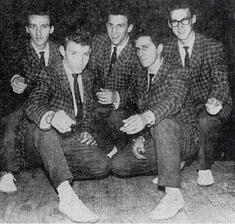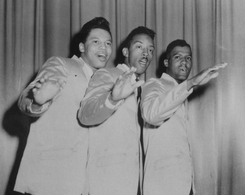-

The Four Lovers (New-York)
Personnel :
Frankie Valli (Lead)
Hank Majewski (Bass)
Tommy DeVito (Tenor)
Nicky DeVito (Tenor)
Discography :
The Four Lovers
1956 - You're the Apple of My Eye / The Girl in My Dreams (RCA 6518)
1956 - Honey Love / Please Don't Leave Me (RCA 6519)
1956 - Jambalaya (On the Bayou) / Be Lovey Dovey (RCA 6646)
1957 - Never Never / Happy Am I (RCA 6768)
1957 - Shake a Hand / The Stranger (RCA 6812)
1957 - The Stranger / Night Train (RCA 6819)
1957 - My Life for You / Pucker Up (Epic 9255)
1957 - I Want a Girl (Just Like the Girl That Married Dear Old Dad) (RCA LP 1317)
1957 - Such a Night (RCA LP 1317)
1957 - (I Love You) For Sentimental Reasons(RCA LP 1317)
1957 - Joyride (RCA LP 1317)
1957 - This Is My Story (RCA LP 1317)
1957 - Memories of You (RCA LP 1317)
1957 - It's Too Soon to Know (RCA LP 1317)
1957 - San Antonio Rose (RCA LP 1317)
1957 - White Christmas (RCA LP 1317)
1957 - Cimarron (RCA LP 1317)
1957 - Lawdy Miss Clawdy (RCA LP 1317)
1959 - It May be Wrong / Please take a chance (Decca 30994)Frankie Valle & The Romans (2)
1959 - Come Si Bella / Real (This Is Real) (Cindy 3012)Biography :
The Four Seasons are justifiably among the most fondly remembered pop/rock vocal groups of the early to mid-'60s. Their soaring harmonies, coupled with Frankie Valli's exquisite falsetto lead on romantic, teenage-oriented songs, were as central to the early-'60s music scene as the work of the Beach Boys, Del Shannon, or any other top rock & roll names one cares to invoke from that period. But before Valli and company emerged with their first hit in the summer of 1962, they spent eight years working in music, first as the Variatones and, more permanently, as the Four Lovers. They never charted a record higher than number 62 (their only chart entry), but did record more than two dozen songs, including a complete LP for a major label. And their music roots were closer to Frank Sinatra than to Elvis Presley.

The Four Lovers started out in the early '50s, but the individual members' musical backgrounds went back to the 1930s. Their whole story started with the DeVito family of Belleville, a working-class town in northern New Jersey just outside of Newark, part of the same locale that produced Frank Sinatra, Connie Francis, and Lou Costello, among other performing legends during the 1930s. The whole family was musical and, beginning with eldest son Danny, took up singing and an instrument from their father. Tommy DeVito (born June 19, 1928) emerged in music at the age of ten, appearing on Major Bowes' Original Amateur Hour.
Two years later, he was singing and playing guitar with Nickie & the Starliters, an octet modeled after the professional pop (or "sweet," as they were called) bands of the era, led by his older brother Nickie DeVito (born September 12, 1924), who also played bass. They made a decent part-time living, picking up extra cash playing dances, weddings, and parties until World War II and the draft broke up their membership. After World War II, the two DeVito brothers tried keeping their hands in music and hooked up with Nick Macioci (born September 19, 1927, and better-known in later years as Nick Massi) to form what became the Variety Trio. They played local clubs, all of them singing, with Tommy and Nickie DeVito on lead and rhythm guitar, respectively, and Massi playing the upright bass. After a couple of years of successful local gigs, they added a fourth, part-time member who began showing up at their performances, Frank Castelluccio (born May 3, 1934, and later known as Frankie Valli). He was 16, had a distinctive voice, and a repertory of two songs, "I Can't Give You Anything but Love" and "My Mother's Eyes."

The sight of the slightly built teenager with the falsetto voice doing those pre-war songs was a novelty in itself, and they went over well with the group's audience. The trio split up in 1952, and for a time during the next couple of years, Castelluccio and Tommy DeVito worked together in various backing bands and recorded a pair of songs together under the auspices of Corona Records in New York. They formed a new group, the Variatones, with Hank Majewski on rhythm guitar and Billy Thompson on drums, while "Frankie Valley," as he was calling himself by then, handled the bass. In early 1956, they got an audition for RCA Victor, where they impressed the executives present with their harmony singing and their mixed repertory of country music and R&B.
This wasn't an uncommon mix at the time, nor was it unheard of for white vocal groups who were the least bit adventurous. A few white outfits, such as the Crew-Cuts, became notorious in purist circles for making more commercially successful covers of R&B singles by black groups, but many did take up the music with only the most honest and honorable intentions -- because they liked it -- and one outfit from Texas, the Mints, was regarded at the time as a serious white equivalent to the Treniers. The Variatones liked the music and had the talent and years of experience, together and collectively.


The group got a contract and a new name, the Four Lovers, and began a year-long stay with the record label. Thompson was soon gone from the lineup, with Valley moved over to drums and Nickie DeVito back in the fold on bass. They made their recording debut with a decided R&B emphasis, including a pair of Otis Blackwell songs, "You're the Apple of My Eye" and "Diddilly Diddilly Babe," "Honey Love" from the Drifters, a cover of Faye Adams' "Shake a Hand," and "Please Don't Leave Me," written by Fats Domino.
There were rocking sides there, though not even necessarily the kind of harmony based music that could be described as doo wop. Their version of "Shake a Hand" was as much a showcase for Tommy DeVito's hot guitar playing as it was for the group's backup singing, and the lead vocal is closer to Elvis Presley than to the falsetto singing that Valli would succeed with fronting the group six years later. Blackwell's "You're the Apple of My Eye," which had such a mannered and exaggerated performance that it almost sounded like a parody of R&B harmony material, ended up as the Four Lovers' one and only chart entry, peaking at number 62. The group kept trying and RCA kept trying with them, releasing another single and then an entire LP, entitled Joyride.


The latter is interesting to hear, both as a cultural artifact for the variety of vocal material (which includes a rocked up version of Irving Berlin's "White Christmas" and a cover of Lloyd Price's "Lawdy Miss Clawdy," and also pop numbers, a concession to the fact that early rock & roll listeners didn't buy many LPs) and as a document of the group's range, stuck in among the vocal numbers is the title track, an instrumental which was a surprise coming from a group known for its singing. By that time, rock & roll was sweeping the charts and the group's act was appropriately oriented toward harmony versions of R&B material. It wasn't enough to sell them to the public and in early 1957, they were dropped by RCA Victor.

The group stayed together, continuing to cut songs for Epic and OKeh, and by 1958, their lineup had changed with Nickie DeVito and Hank Majewski leaving to be replaced by Nick Massi and Hugh Garrity, both of whom drifted in and out of the group. In late 1959, they added Bob Gaudio, an ex-member of the Royal Teens who was a natural songwriter. That same year, they made their first contact with Bob Crewe, a producer who was always looking for local talent in the New Jersey/Pennsylvania area that he might record.

The Four Lovers came to an end as a name but not a group during the next few years. They did a lot of backup singing on behalf of other artists in sessions run by Crewe, and occasionally cut records of their own for local labels under various names until they finally settled on the Four Seasons in 1961. Their lineup, by then, was Frankie Valli, Bob Gaudio, Tommy DeVito, and Nick Massi. The group wasn't working nearly full-time or making much money, however, and by 1962, Valli was making his living in construction. It was in the spring of that year that Bob Gaudio came up with a song called "Sherry," that he insisted by given to Valli and their group to cut. Crewe agreed and released by the Vee-Jay label, it hit number one nationally barely a month after release, thus beginning a new, more visible and successful phase in the history of the Four Seasons.
Bruce Eder, All Music Guide
Videos :
You`re The Apple Of My Eyes
Baby Please Don`t Go
Songs :
The Girl In My Dreams Memories of you
Honey Love JambalayaCD:
 your comment
your comment
-

The Swallows (Baltimore)
Personnel :
Eddie Rich(Lead)
Earl Hurley(Tenor)
Herman 'Junior' Denby(Lead/Baritone)
Frederick 'Money Guiter' Johnson(Baritone/Guitar)
Norris 'Bunky' Mack(Bass)
Irving Turner (Tenor/Baritone)
Discography :
1951 - Will you be mine / Dearest(King 4458)
1951 - Wishing for you / Since you've been away(King 4466)
1951 - Eternally / It ain't the meet(King 4501)
1952 - Deed i do (King) (Unreleased)
1952 - Tell me why / Roll, roll, pretty baby(King 4515)
1952 - Beside you / You left me(King 4525)
1952 - I only have eyes for you / You walked in(King 4533)
1952 - Please, baby, please / Where do I go from here(King 4579)
1952 - Oh promise me (King) (Unreleased)
1953 - Laugh / Our love is dying(King 4612)
1953 - Bicycle tillie' / Nobody's loving me(King 4632)
1953 - Pleading blues / Trust me(King 4653)
1953 - It feel so good / I'll be wating(King 4676)
1954 - My Baby / Good time girls (After Hours 104/Chariot 104)
1954 - Walking by the river (After Hours) (Unreleased)
1956 - Come back to me (Decca 29828)
1958 - Angel baby / Oh lonesome me (Federal 12319)
1958 - Rock a bye baby rock / We mant to rock (Federal 12328)
1958 - Beside you / Laughing boy (Federal 12329)
1958 - Itchy twiychy feeling / Who knows, do you? (Federal 12333)
1958 - In The Palm Of My Hand (Federal) (Unreleased)
Biography :
The Swallows were, like their neighborhood influences The Vibranaires, from Baltimore, Maryland, and began their vocal harmonies soon after the end of World War II. They originally called themselves The Oakateers, but by 1949 were called The Swallows. The chosen name was as the story goes, in deference to their mentors who now called themselves The Orioles. After a number of local gigs in the Baltimore area, they came to the attention of King Records of Cincinnati and soon a recording session was arranged for the young singers. The group consisted of Eddie Rich, Fred Johnson, Junior Denby, Norris Mack, and Earl Hurley.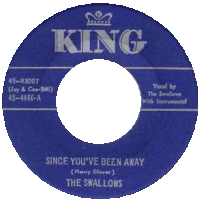

The first recording for the label was released in the spring of 1951 on King #4458. It paired "Will You Still Be Mine" and "Dearest". By July the record was a big seller in the bay area of San Francisco and Oakland. The popularity of the new group led to their first tour in which they were on the bill with the Count Basie Orchestra and vocalist Earl Williams, and hit a number of one nighters in the Eastern half of the country.About this time King #4466 was out pairing "Since You've Been Away" and "Wishing For You". By the end of the year the third release on King hit the streets - #4051 which paired "Eternally" and the ribald jump tune "It Ain't The Meat (It's The Motion)". The jump side was a big seller in the South especially in Georgia and the Carolinas.
In March of 1952 The Swallows played an early fifties dream bill on stage at the Earle Theater in Philadelphia with Johnny Ray (imagine the scene for that twosome !). The following month the group is well received at the Howard Theater in Washington D.C. on a show with the Sonny Thompson Combo and vocalist Lula Reed. King #4515 "Tell Me Why" / "Roll Pretty Baby" was released shortly after New Year's day and somehow got lost in the shuffle. The next King record which came out in April was #4525 was "You Left Me" and "Beside You" with Junior Denby taking over lead singing chores from Rich. Soon after the release of their new record, The Swallows play for two weeks in Atlantic City, New Jersey and get ready for their first extensive tour of the South.
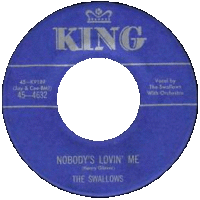

In May King releases the group's take on the fine pop standard "I Only Have Eyes For You" which predates the Flamingos version by six years (as an added bit of circumstance, The Flamingos were originally known as The Swallows until they discovered the King group had first dibs on the name !). The flip side on this record was "You Walked In". In August of 1952 The Swallows do a number of shows with Cleveland dj Alan "Moondog" Freed, along with Edna McGriff and the Buddy Lucas band.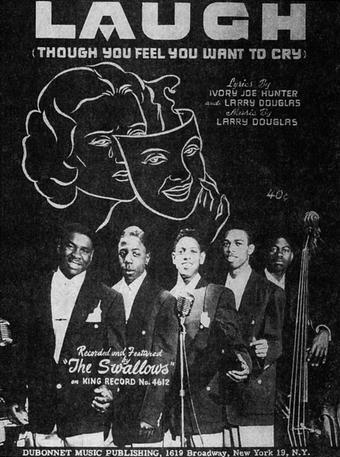
The shows do huge business in Lorraine, Akron, and Youngstown with SRO crowds. In mid September the group prepares for a seven week tour of the South where they remain popular. The touring show also features Wini Brown, H-Bomb Ferguson, Lil' Miss Sharecropper (LaVern Baker) and the Todd Rhodes Orchestra. While on this tour King puts out #4579 - "Where Do I Go From Here" and "Please Baby Please". The Swallows close a very successful year on the West Coast doing shows with R & B showstopper Amos Milburn.
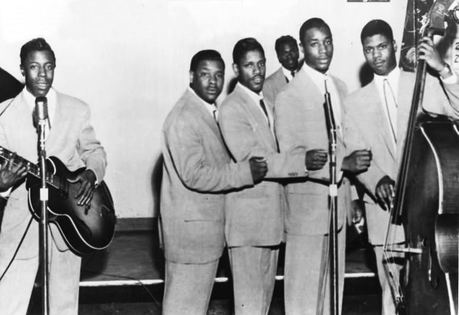
In early 1953 King #4612 is released - "Our Love Is Dying" / "Laugh". While traveling between appearances in Pennsylvania in February, the group is involved in an auto accident near Lancaster. They are fine physically but while waiting for needed auto repairs the group makes news locally by giving an impromptu concert at a nearby convalescent home. That spring King releases the mystically named "Bicycle Tillie" and "Nobody's Loving Me". "Pleading Blues" and the fine ballad "Trust Me" is next on King #4656 in late summer, and by the end of the year, the end is in sight for the group on King Records. The last release for the label is #4676 - "I'll Be Waiting" and "It Feels So Good".
By the end of 1953 the Swallows in their original form disbanded after five years together and two years of recording for King.
A revamped group gets together with remaining members Earl Hurley and Eddie Rich, original late 40s member Irv Turner, along with Al France and Ernie Bailey. By the spring of 1954 this new group of Swallows recorded one record for Lexy "Flap" Hanford's After Hours label : #104 - "My Baby" and "Good Time Girls" which sold fairly well in the group's home town of Baltimore and in Washington, D.C. After that one release for After Hours the group disbanded for good. But - not quite.

Four years later in the rock & roll teen idol phase, here comes The Swallows again. This time it is a group that evolved from a casual get together with original members Eddie Rich and Earl Hurley and singers Calvin Collette and Buddy Bailey (not the Clovers' Bailey) and back they were with Syd Nathan's R & B empire in Cincinnati, but this time on the Federal label. Four sides were issued in 1958 by this newly reconstituted version of the group. Federal #12319 - "Angel Baby" and "Oh Lonesome Me" both obvious covers, #12328 - "We Want To Rock" and "Rock-A-Bye-Baby Rock" trying to appeal to the late 50s teens, #123229 - "Laughing Boy" / "Beside You", and #12333 - "Who Knows, Do You?" and a cover of Bobby Hendricks "Itchy Twitchy Feeling" a straight rock & roll number. This last tune actually just barely touched the national pop charts in late 1958. Mercifully (in a way) this slight success did not breed a host of warmed over covers by the group.
Soon after, the Swallows were history leaving a legacy of more than a decade of music making and two years of super stylings by an inventive and dynamic vocal group that once again, had peaked too soon and thus was missed by the majority of listeners that came to know and appreciate the Rhythm & Blues performers of the early and mid fifties. But collectors know and treasure the King sides as a part of the history of this glorious music.
http://home.earthlink.net/~jaymar41/swallows.html
http://home.att.net/~freebizak/Swallows/swallows.htmlSong :
Eternally Since you've been away
Roll, roll, pretty baby Who Knows, Do You
It ain't the meet Beside you
CD :
MP3 :
 1 comment
1 comment
-
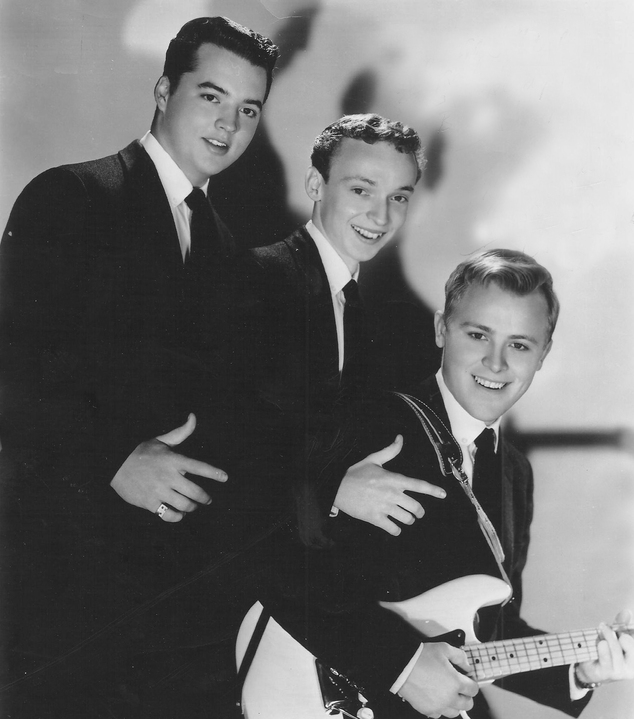
The Original Casuals (Dallas,Texas)
aka The Casuals (2)Personnel :
Jay Joe Adams
Gary Mears
Paul kearney
Discography :
Singles :
The Casuals (2)
1958 - So Tough / I Love My Darling (Back Beat 503)The Original Casuals
1958 - So Tough / I Love My Darling (Back Beat 503)
1958 - Ju Judy / Don't Pass Me By (Back Beat 510)
1958 - Three Kisses Past Midnight / It's Been A Long Time (Back Beat 514)
Ep :
The Original Casuals
1958 - Three Kisses Past Midnight / So Tough / I Love My Darling / Ju Judy (Back Beat EP 40)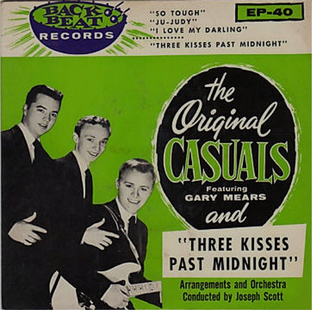
Biography :
In August 1957, Don Robey, president of the Houston-based Duke-Peacock labels (One to the few successful Afro-American businessmen in a caucasian dominated industry), announced the formation of a new label, Back Beat, aimed at the burgeoning rock'n'roll market, Duke and Peacock being primarily gospel and R&B outlets. "The artists appearing under our new label are in most instances teenagers in actual age count or at heart". explained Robey punctiliously, "and as such, our new baby Back Beat is dedicated to the teenage market."


Back Beat made a strong start when "Tell Me Why" by Norm Foxx & the Rob Roys (a New York Group) became a regional hit and "So Tough" By the Casuals, a trio from Dallas reached the national top 50. Gary Mears (aka Frederick Gary Mears) formed the Casuals with Jay Joe Adams and Paul Kearney in Dallas in the Summer of 1957. Don Robey's A&R man Joe Scott (the bandleader on most of Bobby Bland's classic side on Duke) flew to Dallas to record "So Tough" / "listen My Darling" at Sellers Studio in October 1957.
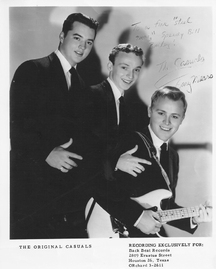

The Song became an immediate hit in Houston and Dallas regions where Robey held sway among influential Dee jays but was slow to move elsewhere. In December, Challenge Records of Hollywood recorded a cover version with a black vocal group, the Kuf-Linx, and this too became a territorial hit, mainly o the West Coast. Robey sent the Casuals out on the road to visit disc jockeys and on 19th February 1958, the trio lip-synched "So Tough" on American Bandstand. On 24 February, the song entered the Hot 100, rising to #42. At that point another group staked a prior claim to the Casuals' name and on subsequent pressings of "So Tough" (in fact, the Majority) the trio were listed as the Original Casuals. Mears remained on the fringes of the Dallas Rock'n'roll scene and later penned "Summer's Comin" by Kirby St Romain, A Top 50 US hit in 1963.
Songs :
So Tough I Love My Darling
Ju Judy Don't Pass Me By
Three Kisses Past Midnight your comment
your comment
-

Little Caesar & The Romans (3) (Los Angeles)
aka The Cubans (2) aka The Upfronts (1)
Personnel :Carl Burnett (Lead)
David "Caesar" Johnson (Lead / Baritone)
Johnny O'Simmons (Tenor)
Early Harris (Tenor)
Leroy Sanders (Bass)
Discography :The Cubans (2)
Single:
1959 - Tell Me / You've Been Gone So Long (Flash 133)
Unreleased:
1959 - Oh Miss Dolly (Flash)
1959 - Don't Go Baby (Flash)
1959 - Can't You See (Flash)
The Upfronts (1)
1960 - It took Time / Benny Lou And The Lions (Lumtn 103)
1960 - Too late to turn Around / Married Jive (Lumtn 104)Caesar & The Romans (3)
N/A - Your True Love / Let The Four Winds Blow (Hi-Note 602Little Caesar & The Romans (3)
Singles:
1961 - Those Oldie But Goodies / She Don't Wanna (Dance No More) (Del-Fi 4158)
1961 - Hully Gully Again / Frankie And Johnny (Del-Fi 4164)
1961 - Memories Of Those Oldies But Goodies / Fever (Del-Fi 4166)
1961 - The Ten Commandments Of Love / C.C. Ryder (Del-Fi 4170)
1961 - Popeye Once More / Yoyo Yo Yoyo (Del-Fi 4177)
1977 - We Belong Together / Disco Hully Gully (Essar 7803)
Unreleased :
1961 - Betty Jean (Del-Fi)
1961 - Three Weeks Ago Today (Del-Fi)
1961 - Twelve Months Of The Year (Del-Fi)
1961 - Memories (Del-Fi)Lps :
1961 - Memories of Those Oldies but Goodies, Volume 1 (Del-Fi LP 1218)
Those Oldies But Goodies (Remind Me Of You)/I Need You So/Ten Commandments Of Love/Little Star/Adorable/Memories Of Those Oldies But Goodies//Hully Gully Again/Work With Me Annie-Annie Had A Baby/Searchin'/Fever/C C Rider
Biography :
Little Caesar was actually David "Caesar" Johnson of Chicago. He cut his musical teeth on gospel music and later did doo wop street-corner duty with some high school friends. When he joined the air force the young Windy City resident formed a gospel act called the Northern Crusaders, and upon his discharge he created a secular group in San Diego named the Ivory Tones after member Ivory Wemberly.
David headed for Los Angeles and joined up with Johnny Simmons (first tenor), Early Harris (second tenor), Leroy Sanders (bass), and someone named Curtis ( second tenor) to form the Cubans in 1955 (though none of the members were Cuban) .

They signed with Charlie Reynolds' Watts- based record label/record store, Flash Records.
The Cubans' only single out of Flash's 623 East Vernon Avenue address was an enjoyable ballad called "Tell Me," with Early on lead, backed by a blues-styled jump tune similar to THE PARAGONS' later "Stick with Me Baby" titled "You've Been Gone so Long," Featuring David. In 1959 the Cubans disbanded (they would not have been too popular under that name anyway during Castro's Cuban revolution), and David hooked up with Lummtone Records, owned by Lummie Fowler. He formed the Upfronts (a name Lummie came up with), who included Harris and Sanders of the Cubans, Bobby Relf of the Laurels (lead and second tenor), and a mystery man remembered only as Theotis (first tenor).
Their first 45, "It Took Time," got a good LA response, but their second, "Too Late to Turn Around," did nothing. When not singing or recording David and company would hang around and drink with the likes of Johnny "Guitar" Watson and Jess Belvin. When they ran out of wine money, Jesse would go to the piano like it was an instant teller machine, knock out a song in 15 or 20 minutes and drive off to Hollywood where he'd unload his rights for a quick 50 to 100 dollars.


One evening in 1961 at Lummie's house David met songwriter Paul Politti, who played him his composition "Those Oldies But Goodies (Remind Me of You)." When David agreed to record it, the 17-year-old writer went to Art Laboe at Original Sound Records, who had started his own series of "oldies but goodies" LPs in 1959. Laboe passed on the song. Politti then sold the idea to Del Fi's Bob keene, so David had to secure a release for his Upfronts from Lummie. When he did, a new act was formed with Johnson, Early Harris, Leroy Sanders, former Cuban Johnny Simmons, and David's first baritone, Carl Burnett. A new Upfronts was formed by Lummie Fowler that included a young bass singer from the area named Barry White.


Now dubbed Little Caesar and the Romans by Paul Politti, David and company ( complete with togas, which the group despised) recorded and released the ode to oldies in the spring of 1961. By July 3rd it was number nine in the nation, heavily outscoring NINO AND THE EBB TIDES' East Coast version. The Romans began touring the country with artists like Etta James, THE VIBRATIONS, and the amazing Jackie Wilson. They appeared on Dick Clark's "American Bandstand," togas and all. On one show in Philadelphia the group lost their togas to overexuberant fans and finished the show in their shorts.
Their follow-up 45, a takeoff on THE OLYMPICS' "Hully Gully Baby" titled "Hully Gully Again," made it to number 54 in August. Their third single on Del Fi was their most nostalgic, combining the most memorable phrases from a whole host of oldies including "A Thousand Miles Away," "In the Still of the Night," "Oh What a Night," "Earth Angel," and the only slow version of "Stranded in the Jungle" ever recorded. The record only " bubbled under" at number 101 in September 1961. Del Fi was losing interest in the group. The Romans recorded an LP that included their fourth single, a nice reworking of the Moonglows classic, "Ten Commandments of Love," along with versions of THE COASTERS' " Searchin ," THE COLTS' "Adorable," and THE ELEGANTS' "Little Star." The group broke up in 1962 and Caesar became a solo act in the '60s and '70s.
Jay Warner (American singing groups: a history from 1940s to today)
... your comment
your comment
-

(L to R) Stan Bracely, Carl Jones, Mickey Stevenson & Joe MilesThe Mello-Dees (Detroit)
aka The Love-Tones
Personnel :Carl Jones (Lead)
Mickey Stevenson (Tenor)
Joe Miles (Baritone)
Stan Bracely (Bass)
Discography :
Herman Griffin & The Mello-Dees
1960 - Hurry Up And Marry Me / Do You Want To See My Baby (Anna 1115/Stepp 237)Tall Tonio (Tony Clark) & The Mello-Dee’s
1960 - Hod Rod Car / Ten Reasons (Stepp 235)Marvin Gaye & The Love-Tones
1962 - Soldier's Plea / Taking My Time (Tamla 54063)Gino Parks & The Love-Tones
1962 - For This I Thank You / Fire (Tamla 54066)Henry Lumpkin & The Love-Tones
1962 - Mo Jo Hanna / Break Down And Sing (Motown 1029Mary Wells & The Love-Tones
1962 - The One Who Really Loves You / I'm Gonna Stay (Motown 1024)
1962 - You Beat Me To The Punch / Old Love (Let's Try It Again) (Motown 1032)
1963 - Laughing Boy / Two Wrongs Don't Make A Right (Motown 1039)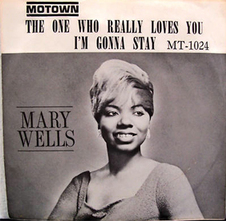

Biography :
Just as The Andantes were Motown's female backing singers of note, so The Love-Tones were briefly their male equivalents. When the Teardrops dissolved after one single for Sampson in 1952/53, Stan Bracely & Carl Jones stayed together and with baritone Joe Miles and second tenor Mickey Stevenson, they formed the Mello-dees. Initially, they backed Herman Griffin & Tony Clarke’s first single under the name of Tall Tonio for Mickey Stevenson's Stepp Records in 1960, but when Stevenson quit singing to concentrate on producing, they changed their name to the Love Tones and became the in-house male backing group.
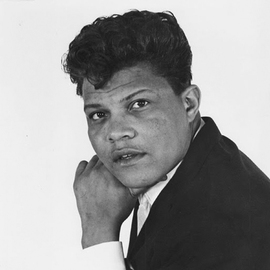
Tony Clark (Tall Tonio)
Although their contributions were usually credited, they were seldom if ever allowed to release anything under their own name, with the result their contribution to Motown would be easy to overlook. However, Carl Jones, Mickey Stevenson, Joe Miles and Stan Bracely had recorded under their own name.

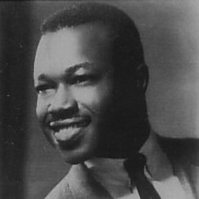

Mary Wells Gino Parks Marvin Gaye
Whilst at Motown they appeared on recordings by Marvin Gaye (Soldier Boy), Henry Lumpkin (Mo Jo Hanna), Gino Parks (For This I Thank You), Mary Wells on her big 1962 hits, “The One Who Really Loves You” and “You Beat Me To The Punch” and many other singers, sometimes credited. They exited Motown in 1962 and seemingly broke up thereafter, although they reformed for a series of recordings for Ian Levine's Motorcity label in the 1990s.
Songs :Herman Griffin & The Mello-Dees
Hurry Up And Marry Me / Do You Want To See My Baby
Marvin Gaye & The Love-Tones
Soldier's Plea Taking My Time
Gino Parks & The Love-Tones
For This I Thank You Fire
Henry Lumpkin & The Love-Tones
Mo Jo Hanna Break Down And SingMary Wells & The Love-Tones
The One Who Really Loves You I'm Gonna Stay You Beat Me To The Punch
Old Love (Let's Try It Again) Laughing Boy Two Wrongs Don't Make A Right
… your comment
your comment
Doo Wop - Rhythm & Blues - Mail : jcpiazza26@gmail.com


